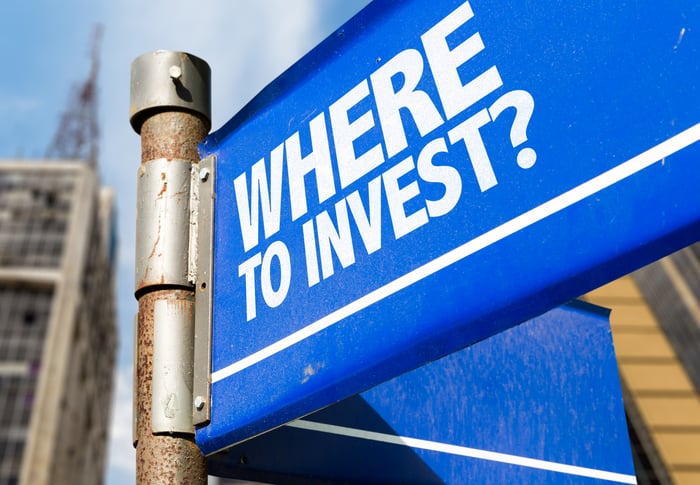If you are looking for a dividend paying infrastructure company today, you might be enticed by Canadian-based Enbridge (ENB 0.68%) and its hefty 7% yield. Giant U.S. pipeline owner Kinder Morgan (KMI 0.27%) and its 6.2% yield might also make the list. But these two companies aren't interchangeable, and one has proven itself to be a more reliable -- and perhaps trustworthy -- dividend stock. Here's what you need to know about this pair and why one is a better pick than the other.
Dropping the ball
Kinder Morgan is one of North America's largest midstream companies. It owns pipelines, storage, and key transportation assets. The company has done a very good job over time of growing its portfolio of assets via acquisitions, divestitures, and ground up construction. It is often looked at as a bellwether name in the midstream space.

Image source: Getty Images.
However, there's a key difference between Kinder Morgan and its closest peers. For starters, Kinder Morgan has long made greater use of leverage. That, in and of itself, isn't a bad thing. However, in 2016 when the energy sector was going through a difficult period, the company's leverage became a notable problem. With capital markets tight, the company ended up cutting its dividend by a massive 75% to free up cash for its capital spending plans.
That's not a terrible thing and was likely the right move for the company. Investors counting on that dividend, however, took a big hit -- and worse, were blindsided by the decision. In fact, just a couple of months before the cut, the company told investors it planned to increase its dividend by as much as 10% in 2016. Effectively, Kinder Morgan went back on its word. Trust quickly became a big issue here. Dividends started increasing again in 2018 with management laying out a three-year plan that would see a 60% dividend increase in 2018, a 25% increase in 2019, and a 25% increase in 2020.
The first two increases went off without a hitch. However, as 2020 has unfolded, Kinder Morgan has walked back from the pledge to increase the dividend by 25%. It offered up a 5% increase and suggested that the uncertainty in the energy sector today was such that it needed to preserve cash. To be fair, a 5% dividend increase is hard to complain about and is much better than a dividend cut. However, the company looks set to fall short of its lofty promises again. If the cut wasn't enough, the current decision to pull back from a promise should leave dividend investors with a bad taste in their mouths. Investors should have material trust issues here, which is more than enough to push this one off of the buy list.
Getting things done
Admittedly, a part of Kinder Morgan's debt issue was a simplification transaction in which it bought several controlled master limited partnership. That move added financial strain at a difficult time. However, Enbridge went through a similar simplification phase, in which it bought multiple controlled partnerships. Its leverage spiked, just like Kinder Morgan. Moreover, like Kinder, Enbridge has long made greater use of leverage than the more conservative midstream infrastructure players. So the spike in the company's debt to EBITDA ratio was worrying.
ENB Financial Debt to EBITDA (TTM) data by YCharts
But Enbridge managed to get through that period without having to resort to a dividend cut. At this point, Enbridge has increased its dividend annually for a quarter of a century. (Note that Enbridge is a Canadian company, so the actual dividend U.S. investors receive will be affected by exchange rates.) It's proven its ability to manage through difficult periods while continuing to reward investors, making it a much better option than Kinder Morgan for dividend-focused investors. The fact that it has a higher yield is just icing on the cake.
That said, business wise, there are some material differences between Enbridge and Kinder Morgan. Like Kinder Morgan, Enbridge owns a massive portfolio of pipeline assets in North America. While Enbridge's Mainline system is a particularly important assets (any problems at this pipeline could quickly lead to financial issues), it also operates a natural gas utility business and a relatively small collection of renewable power assets. So, in some ways, it's a more diversified infrastructure play, which conservative investors will probably appreciate. That also provides the company with more levers to pull when it comes to future growth, as it can put money to work outside of the pipeline space. It currently has CAD $10 billion in projects in the works through 2023.
Management expects contractual rate increases combined with capital spending to boost distributable cash flow 5% to 7% this year. Notably, COVID-19 and the difficult energy market (that led Kinder Morgan to pull back on its stated dividend plans) didn't alter Enbridge's projections. The dividend has already been increased around 9% in 2020 and it's reasonable to expect the dividend to keep growing along with the business over time.
An easy choice
When you invest in a stock you are, effectively, giving your hard earned savings to the management team running that company. Although Kinder Morgan has run its business well, it hasn't lived up to its word with regard to returning value to its shareholders via dividend payments. That sets up a trust issue for income investors that's just not worth taking on.
Enbridge, meanwhile, has done a much better job of ensuring its shareholders see a return on their investment, through thick and thin. Add in a more diverse collection of assets and a higher yield, and investors should find it's an easy pick over Kinder Morgan.






